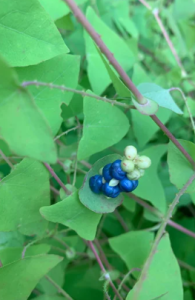As you are exploring the great outdoors this coming spring, be on the look out for the invasive species, mile-a-minute weed.
Mile-a-minute weed (MAMW) is a fast-growing vine that smothers other vegetation and trees. It was first discovered in Michigan in 2020 at Albion College’s Whitehouse Nature Center Since then, MAMW has been found in thirty other locations within Calhoun County. Knowing more about MAMW can help stop the spread and keep out native vegetation alive.

MAMW seeds are quickly spread by foraging wildlife, hitchhiking on equipment or shoes, and by floating down waterways. Seeds can remain viable in the soil for up to six years. Once sprouted, MAMW can grow up to 6 inches in a day and up to 30 feet long during the growing season. Its barb-covered vines can form dense blankets that climb up trees, take over grasslands, and impact the general enjoyment of your property. MAMW negatively affects habitat, including bedding areas for deer, native plants essential for pollinators, and nesting habitat for seasonal birds. It is crucial to find and eliminative MAMW before it spreads further.
Mile-a-minute weed sprouts in early spring and can be easily identified by its green triangular leaves. The plant has recurved barbs on the leaves and stems that become more hardy throughout its growing season. The clusters of metallic blue fruit can be observed in late summer. The plant dies back at first frost, leaving dense mats that are visible through winter.
The Barry-Calhoun-Kalamazoo Cooperative Invasive Species Management Area (BCK CIMSA) has been working to control the spread of this plant since 2021. All surveying and treatment costs are currently funded by the Michigan Invasive Species Grant Program. Contact BCK CISMA Program Specialist, April Savickas, to set up a property survey. April can be reached at bckcismamamw@gmail.com or 269-908-4133.
Learn more about BCK CISMA at BarryCD.org/BCK, information and photos in this article is provided by April Savickas.
